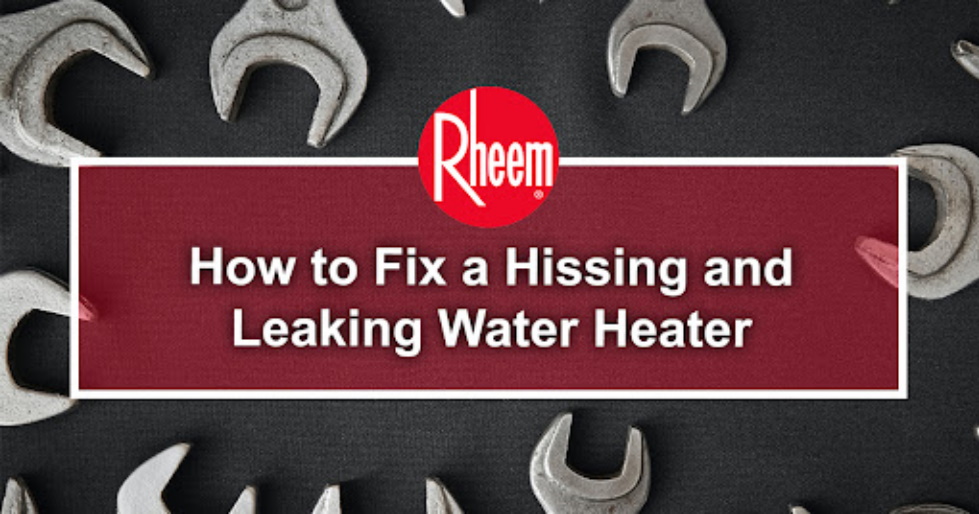-
Products
- Residential
- Commercial
- Home Enhancements
- Warranties
- Promotions
- Find a Dealer
- Sustainability
- Blog
- Contact
- Why Rheem
-

- Countries

Is your water heater making loud banging noises, high pitched whistling noises, or hissing noises? Or might you be dealing with a leaky water heater?
If you are currently experiencing a noisy or leaking water heater problem, there is no need to worry! We have compiled four common reasons why these issues may be happening to your water heater and some suggestions on how you would be able to fix these problems.
Before delving further into the potential causes and solutions, let’s take a look at the average lifespan of water heaters and which type of water heater is more likely to experience these types of issues.

Storage water heaters can last an average of around 10 years and instant water heaters can last an average of around 15 years. This is assuming that there is normal usage of the appliance and that the water heating appliance is properly maintained. To ensure that your water heating device is operating efficiently and optimally, it would be recommended to regularly service and perform routine inspections of the appliance.
Some of the ways to potentially extend the lifespan and efficiency of the water heater would be to control the temperature that is set on the water heater, schedule a routine cleaning of the tank of the storage water heater and also schedule a regular inspection of the fittings of the water heater. The cleaning of the storage water heater tank and inspections of the water heating appliances do not have to be done on a very frequent basis, however, it would be recommended to clean your storage water heater’s tank once a year and your water heating appliances checked at least once a year.
Since storage water heaters have a storage tank to store large amounts of water, it is more likely for this type of water heater to experience sediment or material build up over time. If the water heating appliance is not properly maintained, it may result in issues such as leaks and hissing sounds coming from the water heater.
Before we move on to the possible reasons why your storage water heater may be acting up and recommend possible troubleshooting methods, it is important to remember to practice caution and safety when tinkering with your water heater. Before making any adjustments or fixes to your water heater, remember to turn the appliance off and disconnect it from its power source. If the issues you are facing still persist, call a professional for a consultation or help with your water heating appliance.

Condensation is a common and obvious cause of a hissing water heater. When cold water enters the water heater tank, condensation accumulates on the water tank’s exterior. As the condensation drips out, it may come into contact with heated elements of the water heater, producing a loud hissing or sizzling sound.
The smaller the water heater, the more likely condensation will occur and form on the tank. A well-designed or larger water heater will produce little to no condensation as the tank fills and the water heats up.
Condensation in the tank usually results in infrequent hissing noises, thus, if you only hear your water heater hissing every once in a while, there are no significant issues with your water heater. However, if the hissing persists and is increasingly frequent, it may indicate that your water heater has an internal tank leak. In this case, it would be recommended to contact a professional plumber for assistance with your water heating unit.

Since storage water heaters store large amounts of water in the tank for extended periods of time, the appliance is more prone to sediment buildup. The accumulation of sediments in the storage water heater tank is more likely in areas that have a high concentration of minerals in the water – or also known as hard water.
Hard water causes dissolved minerals like calcium and magnesium to crystallise and settle at the bottom of the water heater tank, where they eventually build up into a thick hard layer. The accumulation of sediment holds water droplets as they boil and produce steam.
The trapped moisture between the layers becomes extremely hot and continues to boil, causing it to flow into steam, which may produce a hissing sound and water leakage. Usually, the solution to this problem is to flush and clean the water heater tank regularly. By regularly flushing the water heater it would also help reduce damages to the inner tank as the sediment could also move around in the tank and scrape the coating of the tank.
Another good reason to flush your tank regularly is due the sediments being a potential breeding ground for bacteria. The accumulation of bacteria may cause health problems in the long run. Additionally, the bacteria may also cause an unpleasant smell when the water heater is used.

If the output temperature of the water heater is set too high (140°F or 60°C and above), the Temperature and Pressure Relief Valve (T&P Relief Valve) will open to compensate for the increased internal pressure. Water may leak via cracks, loose fittings, and other areas when the pressure grows too high.
To solve this problem, it would be recommended to reduce the water heater’s temperature to around 120°F or 48°C . The Temperature and Pressure Relief valve should also be replaced after being opened because it is no longer functional. It would also be recommended to call a plumber if the Temperature and Pressure Relief valve is no longer working on your water heater as it would result in safety issues if not fixed promptly.
Similar to condensation, a water tank leak causes water to flow out and come in contact with heated surfaces which causes water hissing sound and leakage. Spotting moisture or condensation beneath the storage water tank is another indicator of a leaking water heater. The first possibility is that a loose valve has to be tightened or that the water tank has a significant leak.
If you find a leak in your water tank, contact a plumber to rectify the problem. In most cases, the only option to solve this issue is to replace the whole water heater as a leaky water tank cannot be fixed.
If you are still hearing loud noises coming from your water heating unit or if your water heater is leaking, it would be recommended to contact a professional plumber for consultation or to consider changing your water heater unit.
In case you are looking for a new water heater, you can consider Rheem. Here at Rheem, we focus on producing high-quality, reliable and durable water heating solutions. With almost 100 years in the water heating industry, Rheem has developed innovative and advanced water heating solutions for both residential and commercial projects.
Rheem Malaysia has an extensive range of storage water heaters and instant water heaters to cater to all your hot water needs. Visit our official website to browse the range of instant water heaters and storage water heaters available. Enjoy the best hot shower experience with Rheem today.
Subscribe

At Rheem, we strive to innovate
best-in-class products to lead the industry
in
environmental improvements.
Sustainability